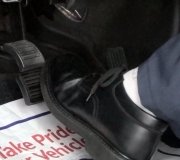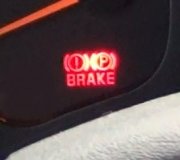No insult intended although I can see how it could read that way. Sorry. 99 percent of the people who visit this site are do-it-yourselfers. Some are fairly knowledgeable, and some shouldn't be touching anything safety-related on their cars. If you don't state anything about your background, we have to infer the best we can from what you typed. Here's how I interpreted your comments:
"it goes down to the floor after a short time". The key word to me was "a short time". That implies internal seal leakage which typically happens after they have been run over the debris. Up here in Wisconsin, the road salt capital of the world, this is real common. I tell my students to pretend there is a 4x4 block of wood under the pedal, and to never press it more than half way to the floor unless it is a new master cylinder. Still, every year we have two or three master cylinders that are damaged. We have a breakage fund to cover the cost of the replacement units for our customers. How you handle this situation if it ever happens to you is up to you, but most shops in this area warn customers of this possibility when they come in with a popped hose that may have resulted in them running the pedal to the floor. A couple of shops won't even warranty their work if they aren't also allowed to replace the master cylinder. The only other thing that will cause a slowly sinking pedal is an external leak. I ruled that out because if you're knowledgeable enough to replace pads, bleed the system, and tell if the rear brakes are working, you must be smart enough to look for signs of a leak. There is nothing to indicate parts were replaced in the hydraulic system so I assumed you were bleeding the system in response to the low pedal. No air should have been able to enter so it's logical to think the seals were damaged while pumping the pistons out. It only has to happen once to make life miserable.
"Appears rear brakes only are working": This suggests you aren't aware this is a split-diagonal hydraulic system. I could very likely be wrong, but remember, most people who would post the exact same description don't even know what is meant by that term. Even if one seal got damaged in the master cylinder, one front brake should still be working and one rear brake should not be. One question in my mind was if you knew that the pedal had to be pumped a few times to move the pistons out to contact the pads and rotors. Please don't take offense at that thought. We run into that all the time. I didn't mention it in my reply because you have obviously been working on this problem long enough that the pistons are surely out by now.
I apologize if my reply seemed condescending. That certainly was not my intent. My standard replies take care of most of the problems similar to yours. If you're still fighting a sinking pedal, I will be very surprised if a new master cylinder doesn't take care of it. If it comes to that, I can share a little trick too that makes it unnecessary to bleed the system by the wheels.
Caradiodoc
Sunday, April 4th, 2010 AT 6:32 AM



